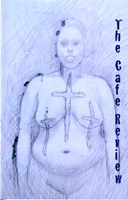Rosy

by Patrick Dillon
Once upon a time when yellow hens
laid purple eggs, not long before she touched
the car and went off into the photograph.
high above the poultry sodden straw
my sister crawls before me on the beam.
I will remember this
the chill of a fool’s danger. We’d got it wrong.
Space and things that should have been in front
of us had slipped and swung below.
The air pranced.
Death looked on.
I will remember this.
My part in the clamour of rotten duck eggs.
Not her voice, not her face
but the sandals and her smiling calves
the squares of thread raised rough and white on beige
and that she spoke to me
turned and told me something never to forget
long ago
when playful plastic hens dropped eggs like answers.
God takes the best for himself they said.
I was left with the rest.
With alphabets and joined up letters
with elders and their tattered tales
of war and Devon Tuttle.
Their titled toes
the flippant tails, the waltzing ways
of sweats and quitters.
With dogs and cats and ponies to love.
Between the lines the slamming grey of car doors.
My toes itched.
How did a girl become a word, her name
a prayer falling like a key into the dark?
We all knew where her sandals were, stuck
upstairs in the hush of the cupboard
in the mouthing silence, waiting in
plastic for her stubborn broken beads.
Song of the Slave Poets

by Patrick Dillon
We go blind at the deskpit
Fussing out our commas
Feeling for something like a teapot
That will contain everything.
Life is less.
Death will sort us out.
Someone will find a sparrow’s collarbone
Our absence
Will glower above the waves.
Chandelier

by Joanne Lowery
For lack of a better name, let us call
this darkness “Klimt.” True, squares
of white and gold tile his paintings,
naked fish blooming among flowers
that wink, bubbles on their way to nowhere.
Vienna had traded candlelight for electric chandeliers.
At times, a woman’s thin face, her simple legs,
her drying hair made him happy.
You — even you — turn a plastic switch
to make life meaningful.
Now beauty can be understood,
and the war that everyone knows is coming
sparkles in the distance like stars.
Plath to Her Scholars

by Joanne Lowery
Girls, aren’t you the ones who under the guise
of “get a life” subsist in universities
with towers of my books piled on your nightstands?
Your unshared beds.
Your color – coded files of notes
about my ted, my bitchy syntax,
the brilliance you will never know.
Keep studying symbiotically and symbolically
how I felt about giraffes,
write a thesis about my favorite vegetable.
My purpose in life was only
metaphors, babies, betrayal, and dissertations.
Surely your apartments have kitchens
with stoves, their oven doors obedient.
You can steal matches from the corner bar.
The dark square, racks removed,
waits for you too. But I won’t be
available to escort you to literary afterlife,
and my last thought is forever mine.
Girls, if you want to be writers,
close the book on me and write your own.


